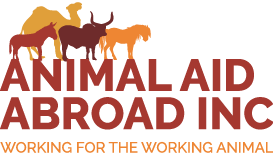Overworked Donkeys in Somaliland Receive Free Vet Care
There are approximately 120,000 donkeys in Somaliland and they play a significant role in supporting poor communities and people’s livelihoods. The majority of donkeys pull heavy carts for their owners, filled with water containers, building materials, firewood and other essential supplies. Unfortunately, donkeys here are overworked, overloaded and not provided with adequate feed, care or veterinary treatment. Harness equipment is frequently poor quality and causes needless wounds and pain for donkeys. These vulnerable working animals often die of treatable illnesses and are forced to work while injured or ill. Animal Aid Abroad are providing funding and support for Social and Animal Welfare Service (SAWS) to enable them to provide free veterinary care for working donkeys in Hargeisa and thereby improve their lives.
In February, SAWS’ Vet Clinic treated 175 donkeys, mostly in areas where the animals were already working. Two vets were involved in the clinic operations, alongside a para-vet and technician. The most common presenting health problems were infected wounds from improper harnesses, skin diseases, worms, external skin parasites and laminitis. Proper veterinary care and treatment was completed in all cases.
These recent clinic operations have revealed that most donkeys in Hargeisa are hired out to young men who don’t have adequate skills or knowledge of animal welfare and often badly beat donkeys to make them move faster. SAWS also discovered that working donkeys are frequently injured by ill-fitting, improper harnesses, leaving many animals with open wounds and lesions. Owners often simply put a rope around their donkey’s neck, causing painful sores when the animal pulls heavy carts.
Other challenging donkey welfare issues that have been noted by SAWS include:
· A lack of shade and no shelter for donkeys overnight
· Tying donkeys’ legs together
· Donkeys being subjected to inhumane traditional treatments, such as mutilations or burning the skin
· Lack of adequate food and water
· Limited ability for donkeys to perform natural behaviour
As a result of these findings, SAWS are planning to provide education for donkey owners on how to provide proper care for their animals and reinforce the ways in which having a healthy donkey will benefit them also. Additionally, they will provide humane harness-making training for owners, which will teach them how to make suitable donkey harnesses from available local materials.
SAWS have already made visible changes in the lives of Hargeisa’s donkeys and are gradually improving the overall status of their health and welfare. Donkey owners and the Ministry of Livestock alike have expressed their appreciation of Animal Aid Abroad’s funding for this much-needed project in Somaliland.









